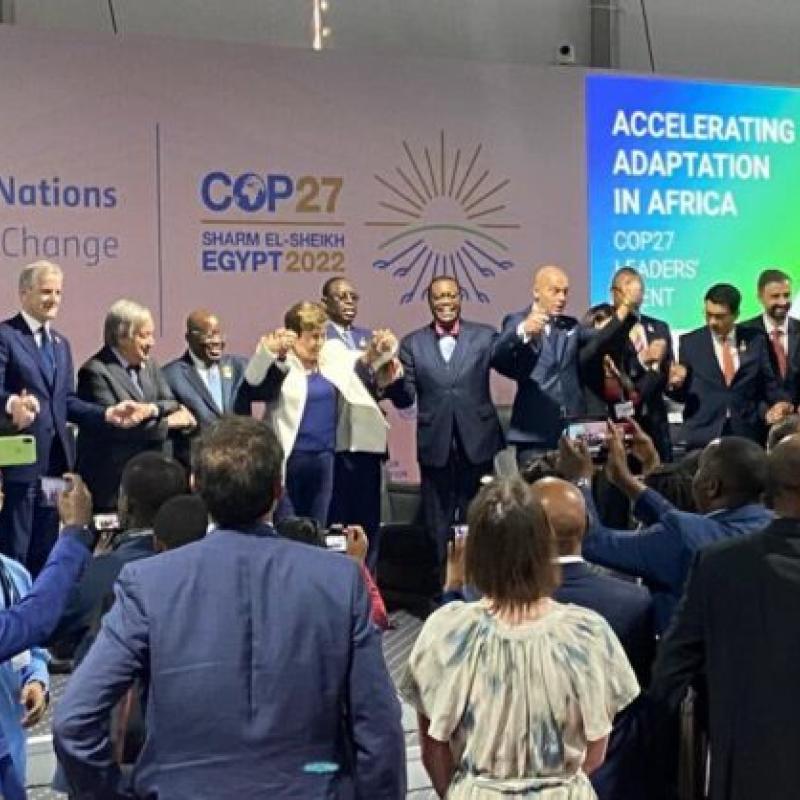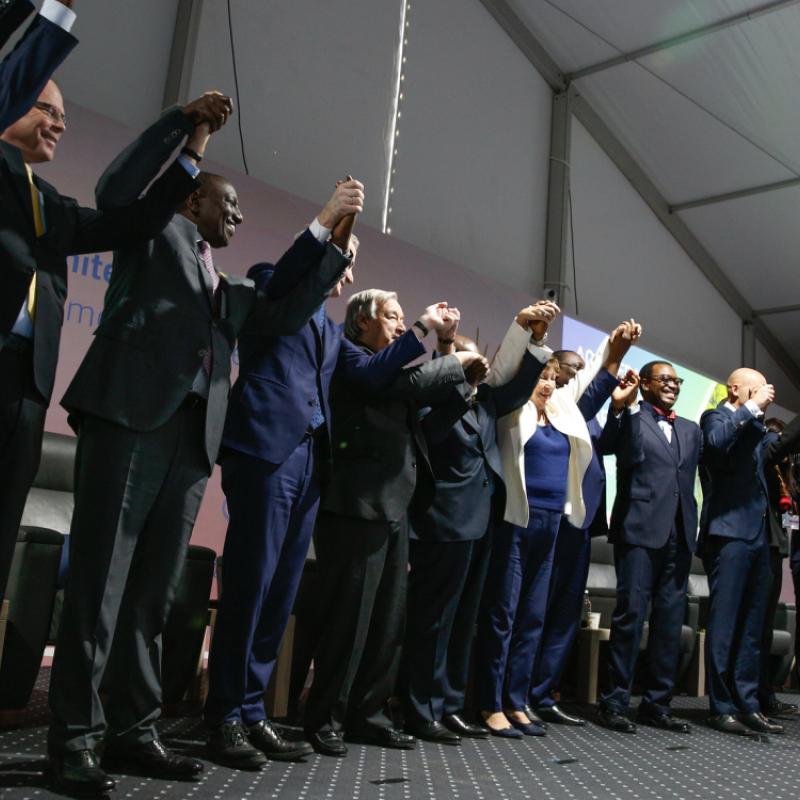
AAAP in the Media
Displaying 1 - 10 of 10
Youth Adaptation Solutions Challenge Francophone Cohort
The Youth Adaptation Solutions Challenge is an annual competition and awards program for youth-led enterprises (50% women-led) organized by GCA and AfDB as part of the Youth Adapt Flagship Program.
The competition invites young entrepreneurs and Micro, Small and Medium-sized Enterprises in Africa to submit innovative solutions on climate adaptation and resilience. The winners will be part of a 1-year incubator program, which will provide tailored training on business development and adaptation, coaching, networking opportunities, and grants to enable the youth-led enterprises to scale up their innovative businesses and build resilience among marginalized communities in Africa
The objective of the project is to deliver business development services (BDS) to and build the institutional capacity of youth-led enterprises, positioning them to effectively utilize grants offered and to also mobilize additional private capital, scale up climate action and create employment opportunities on the continent.
- Build youth capacity for employability and unlocking access to finance
- Deliver a 1-year incubator program tailored training on business development and adaptation
- Provide coaching and networking opportunities
- Equip young innovators and MSMEs with customized skills and resources to scale up climate adaptation innovations and boost the creation of jobs
- Grant disbursement to the 5 winners of the YouthADAPT winners
- 12-weeks training with practical skills in entrepreneurship and business development and climate adaptation
- Mentorship to enable the winners to execute their business plans, create jobs, and support the continental effort towards climate resilience
- Training materials developed and training workshops delivered tailored to the selected youth-led start-ups
- Support to the youth led-businesses to develop and implement their business plans and to mainstream adaptation and climate resilience in their businesses
- Delivered business development services (BDS) to and building the institutional capacity of youth-led enterprises
- Youth-led enterprises positioned to effectively utilize grants offered and to also mobilize additional private capital
- Scaled up climate action and ability create employment opportunities on the continent
USD 500 Million
Benin - Port of Cotonou Expansion
The port of Cotonou has a strategic importance in the region, as it is also one of the main gateway ports for the sub-region, in particular the countries of Burkina Faso, Niger and Mali. The port is the economic heart of Benin, handling an annual freight volume of around 11 million tonnes. The Port of Cotonou currently has a 546-metre quay. The 31.2-hectare container park has several modern equipment, including four quay gantries, one mobile crane, 12 RTG (Park Gantries), and 15 reach stackers. With a full container storage capacity of nearly 20,000 TEUs, it has 24-hour docking services
The aim of the sea Port expansion is to part of Benin’s larger plan to enlarge and enhance the Port of Cotonou and strengthen the country's role as a guiding force of local economic development.
- Utilizing cutting-edge climate analytics to identify and quantify the impacts of physical climate risk on the investment
- Delivering high resolution climate risks assessments, adaptation and resilience investment options to climate-proof the investment against the impacts of physical climate risks
- Renovation and deepening of the existing North dock along its 1,391-metre length (16 metres deep with a pile/sheet piling structure)
- Extension of the North dock by 214 metres (16 metres deep with diaphragm walls) and construction of a roll-on roll-off (RoRo) ramp
- Extension of the South dock by 154 metres (15 metres deep with diaphragm walls)
- Extension of the harbour basin with the creation of a rubble mound breakwater at the end of the dock;
- Dredging of all berths to 16 metres, plus maintenance dredging of the basin
- Revamped port’s infrastructure to accommodate Post-Panamax container ships as from 2025
- Enlarge and enhance the Port of Cotonou with modern facilities to accommodate 20 million tonnes
- Strengthen Port of Cotonou role as the country's a guiding force of local economic development
AfDB Investment of USD 44.5 Million of total USD 115 Million
USD 300 Million (Estimate)
Reinforcing Resilience to Food and Nutrition Insecurity in the Sahel (P2-P2RS)
The Sahel, which lies between the Sahara Desert to the north and tropical savannas to the south, is one of the largest semi-arid/arid sub-regions globally. As such, the region is highly vulnerable to climate change and other uncertainties. The impacts of climate change may have critical socio-economic consequences for the Sahel, including poor agricultural yields, increased frequency of natural disasters. Already, the number of people in the Sahel suffering from chronic food and nutrition insecurity, poverty and vulnerability to the effects of climate change is rising steadily.
A lasting solution to food and nutrition insecurity in the Sahel requires building resilience to climate change, long-term agricultural sector financing and developing trade and regional integration. Sustained, longer-term investments in household resilience can significantly reduce the cost of emergency assistance, ultimately breaking the cycle of recurring famine. This is the most cost-effective intervention option which meets the basic needs and preserves the dignity of the populations of the Sahel. This idea is central to the Programme to Build Resilience to Food and Nutrition Insecurity in the Sahel (P2RS)
The overall objective of the P2-P2RS is to contribute to the substantial improvement of the living conditions and the food and nutritional security of the populations of the Sahel region.
Specifically, the program aims to i) strengthen the resilience to climate change of agro-sylvo-pastoral producers, including through promotion of climate-smart agricultural technologies in the Sahel and the development of climate intelligent villages; ii) develop the agro-sylvo-pastoral value chains, including through the development and improvement of hydro, meteorology and climate services; and iii) support regional institutions (CILSS, APGMV, CCRS) to strengthen adaptive capacity in the Sahel.
- Design digital adaptation solutions (Digital Climate Advisory Services, DCAS) for the Sahel context
- Investment readiness and infrastructure, institutional and farmer capacity needs for DCAS
- Feasibility study to integrate DCAS into agricultural extension and agrometeorological advisory to smallholder farmers and pastoralists
- 1 million rural households have access to digital or data-enabled climate-smart technologies
- 500,000 smallholders have adopted adaptation practices
- 5 million smallholders have access to climate services;
- Development and improvement of hydro, meteorology and climate services
- The development of climate-intelligent villages
- Promotion of climate-smart agricultural technologies in the Sahel
- Resilience to food and nutrition security built for the targeted populations
USD 300 million
Country Digital Agriculture and Adaptation Profile: Benin, DRC, Malawi and Tanzania
Food production in Africa is largely dominated by smallholder rain-fed agriculture and the sector is therefore particularly vulnerable to climate change and variability. The continent is already experiencing more frequent extreme weather events and higher-than-average temperature increases. According to a recent report by the Global Center on Adaptation (GCA), the annual cost of adaptation actions is estimated at US$15 billion, while that of non-action is estimated at US$201 billion.
Digitalization offers the opportunity to help farmers adapt to some of the challenges arising from climate change and could lead to in-depth transformation of the agriculture sector. However, the dissemination of digital technology at the farm level risks widening the digital divide that exists for women and marginalized communities. Further, despite the rapid growth of digital technologies on the continent, youth potential as an asset to foster uptake and scale of digital agriculture is not fully exploited. However, in developing countries where wages are lower and farms generally smaller, digital technologies could help to improve management practices and access to markets.
The overall goal is to create a Digital Agriculture and Adaptation Profile (DAP) for the four countries. The study will respond to the question of how digital climate and advisory services (DCAS) can be mainstreamed in implementing the adaptation options and pathways in the National Adaptation Plan, and for the agricultural sector of selected countries. A gender lens will be applied to the studies.
Specifically, the work will include:
- Overview of the agricultural economy of the country, the main value chains, and key challenges facing each of the value chains.
- Analysis of climate vulnerability of major agricultural value chains.
- Evaluation of the landscape of digital agriculture/adaptation (infrastructure, tools, enabling environment, institutions, policies, services).
- Mapping of existing and promising initiatives related to DCAS in the country.
- Identifying key players (public, private, non-profit, international community) across value chains, in digital agriculture and DCAS in the country as well as their roles and solutions.
- Assessing the challenges, barriers and opportunities to the investment, adoption and scaling of DCAS.
- Developing a business case for DAP in relation to investment operations.
- Identifying and prioritizing promising digital climate adaptation solutions that are applicable to help producers in adapting to climate change and in building better resilience across value chains.
- Through the DAP, an assessment of the readiness of the four countries for digital agriculture.
- A holistic review of digital transformation articulated around six topics: the extent of climate challenges and adaptation potentials, digital infrastructure, digital penetration, policy and regulation, business environment, human capital and agro-innovation.
- An opportunity for investment banks to make informed decisions in the planning of ongoing and future projects.
- Developing a DAP can help to identify how to best harness the digital-agriculture-adaptation nexus to facilitate decision-making.
- The results will be used by countries and their partners in implementing DCAS (short-, medium- and long-term investments).
- In supporting the development of DAP, GCA is working with partners to plug the gaps in the information needed to provide contextual understanding of background issues, and to ensure that investments in climate adaptation projects are designed and founded on sound and robust information that provide adequate context of focal/selected countries.
Technical Assistance
Global Leaders Rally Support and Finance for the Africa Adaptation Acceleration Program to Tackle Climate Change in Africa
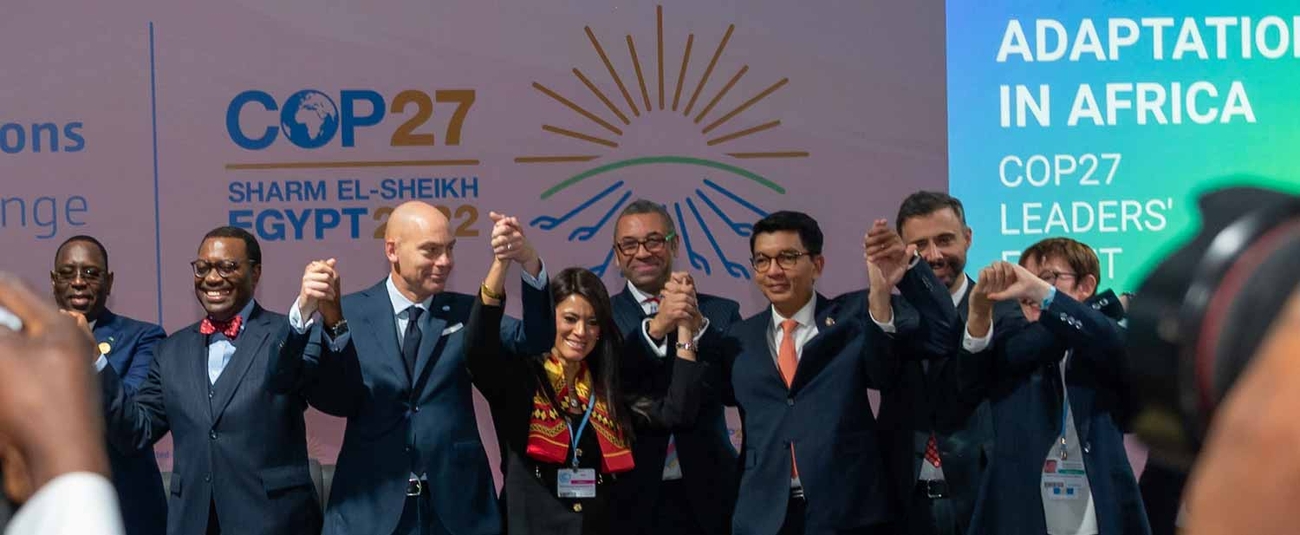
Global leaders on Tuesday rallied around climate adaptation for Africa. They attended the Africa Adaptation Leaders’ Event, convened by African Union Chair President Macky Sall of Senegal, Global Center on Adaptation CEO Patrick Verkooijen, and African Development Bank Group President Akinwumi Adesina.
The event took place at the global climate summit (COP27) in Sharm El-Sheikh, Egypt. It underscored the critical need for climate adaptation in Africa and responded to the call for the capitalization of the Africa Adaptation Acceleration Program (AAAP).
“This is a pivotal step in the fight against climate change,” African Union Chair President Macky Sall said. “The commitments made by Africa’s partners will give the Africa Adaptation Acceleration Program the boost that it needs to transform the development trajectory of the world’s most climate exposed continent. I am confident in the ability of the AAAP to deliver results for Africa.”
The Africa Adaptation Acceleration Program is an Africa-owned and Africa-led initiative developed by the Global Center on Adaptation (GCA) and the African Development Bank (AfDB) in close collaboration with the African Union. It serves as the implementation of the Africa Adaptation Initiative (AAI) to mobilize $25 billion to implement, scale and accelerate climate adaptation across the Africa. Since 2021, AAAP has mainstreamed climate adaptation in over$3.5 billion of investments in 19 countries.
United Nations Secretary-General António Guterres said: “I want to express my total solidarity for the Africa Adaptation Acceleration Program […] I urge the international community to support Africa to mobilize the technical & financial resources for scaling up transformative adaptation.”
“With this innovative program, Africa has developed a plan to grow, create jobs and opportunities for people, and to be resilient against the climate crisis,” said President Akufo-Addo of Ghana. “AAAP’s singular focus on the issue of climate adaptation will also contribute to greater stability and progress in Africa and around the world. AAAP is aligned with Ghana’s plans to address climate change as it chairs the Climate Vulnerability Forum (CVF) to lead efforts from the world’s most climate vulnerable countries to spur and mobilize investment through the Climate Prosperity Plans."
James Cleverly, Secretary of State for Foreign, Commonwealth and Development Affairs of the United Kingdom announced that the UK will provide £200 million to the African Development Bank’s Climate Action Window. This is in addition to the £20 million announced at COP26 in Glasgow to the AAAP Upstream Financing Facility.
Cleverly noted: “Climate change is having a devastating impact on countries in Sub-Saharan Africa facing drought and extreme weather patterns, which have historically received a tiny proportion of climate finance. This new mechanism […] will see vital funds delivered to those most affected by the impacts of climate change, much more quickly.”
Prime Minister Mark Rutte of the Netherlands followed through on the commitment made at the Africa Adaptation Summit held at the Global Center on Adaptation in September to confirm that the Netherlands will contribute EUR110 million to the AAAP, with EUR10 million in support for the Upstream Financing Facility hosted by GCA and EUR 100 million for the Climate Action Window of the African Development Fund at the African Development Bank as part of the Netherlands’ commitment to dedicate half of its climate funding, fully grant based, to climate adaptation, with a focus on Africa.
Norwegian Prime Minister Jonas Gahr Støre echoed African leaders’ calls for countries to rapidly scale up finance for climate adaptation, stating: “The climate crisis is here and now. Years of progress are at risk.”
“The AAAP Upstream Financing Facility is the delivery mechanism of adaptation and will use millions to leverage the billions that is required for adaptation,” he continued. “AAAP projects will generate effective climate adaptation outcomes. Adaptation is a growth agenda. A jobs agenda. And a prosperity agenda. On behalf of Norway, I am looking forward to continuing this partnership, investing in it, and supporting it with the Global Center on Adaptation.”
International Monetary Fund Managing Director Kristalina Georgieva emphasized the need to accelerate adaptation in Africa, stating: “It is paramount to support Africa’s adaptation because Africa will not reach its tremendous potential without it. AAAP complements the IMF’s Resilience and Sustainability Trust, which helps countries address external shocks such as climate change and ensure sustainable growth that can give Africa a chance to leapfrog outdated development models.”
African Development Bank Group President Dr. Akinwumi Adesina said: “Africa is suffering from the devastating effects of climate change. Our continent is being short changed by climate finance. The contributions towards the Africa Adaptation Acceleration Program’s Upstream Financing Facility and the Climate Action Window – which the African Development Bank manages – will help capitalize the program. With increased capital, we can better deliver the investment needed to bridge the adaptation finance gap. We want to ensure that the most vulnerable communities can benefit from a sustainable and prosperous future.”
Endorsing the outcomes of the high-level meeting, Patrick Verkooijen, CEO of the Global Center on Adaptation, closed with a statement emphasizing the AAAP’s impact to date, noting that “there is no pause button on the climate crisis. Africa must adapt to the threat of climate change, and it must adapt now.”
“Through the AAAP,” he continued, “Africa has charted its path towards a climate-resilient future for its youth, its economic growth, and for its prosperity.”
About the Global Center on Adaptation
The Global Center on Adaptation (GCA) is an international organization which works as a solutions broker to accelerate action and support for adaptation solutions, from the international to the local, in partnership with the public and private sector, to ensure we learn from each other and work together for a climate-resilient future. Founded in 2018, GCA is hosted by the Netherlands, working from its headquarters in Rotterdam with a knowledge and research hub based in Groningen. GCA has a worldwide network of regional offices in Abidjan, Côte d’Ivoire, Dhaka, Bangladesh and Beijing, China. Through this evolving network of offices and global and regional GCA teams, the organization engages in high-level policy activities, new research contributions, communications, and technical assistance to governments and the private sector.
About the African Development Bank
The African Development Bank Group is Africa’s premier development organization. Its overarching objective is to spur sustainable economic development and social progress in its regional member countries, thus contributing to poverty reduction across the continent.
The Bank Group achieves this objective by mobilizing and allocating resources for investment in African countries and providing policy advice and technical assistance to support development efforts.
In 2015, all multilateral development institutions agreed on the same set of objectives, the United Nations Sustainable Development Goals.
Learn more: https://www.afdb.org/
About the Africa Adaptation Acceleration Program
The Africa Adaptation Acceleration Program (AAAP) is a joint initiative of the African Development Bank and the Global Center on Adaptation (GCA). It aims to mobilize $25 billion, over five years, to accelerate and scale climate adaptation action across the continent. This ambition is delivered through the AAAP Upstream Financing Facility managed by the Global Center on Adaptation and the African Development Bank’s climate action window in the ADF replenishment. AAAP works across four pillars to achieve transformational results: Climate-Smart Digital Technologies for Agriculture and Food Security; African Infrastructure Resilience Accelerator; Youth Empowerment for Entrepreneurship and Job Creation in Climate Adaptation and Resilience and Innovative Financial Initiatives for Africa. AAAP has already guided over $3.5 billion of upstream investments in 19 countries with every dollar spent influencing $100 downstream.
COP27 - COP27 Leaders' Event, Accelerating Adaptation in Africa (DAY 2)
COP26 Leaders’ Event – Africa Adaptation Acceleration Summit
What: COP26 Leaders’ Event – Africa Adaptation Acceleration Summit
Where: Meeting room 4, Zone F (in front of plenary rooms)/ also available on livestream here: https://bit.ly/31nTtIW
When: 14:15-15:45 on Tuesday 2nd November
Followed by press conference
When: 16:00-16:30
Where: Press Conference Room Durdle Door, Area D - Ground Floor
The future of Africa depends on global action and firm resource commitments to support climate adaptation. The recent IPCCC report highlighted the continent is the most vulnerable to climate change. The Africa Adaptation Acceleration Summit is the moment at COP26 for African heads of state and government to outline how they are ready to play their part to build resilience across the continent. They will outline the commitments made and the actions required by global partners for a sustainable future.
Confirmed speakers
Host’s Keynote address
Félix Tshisekedi, President of the Democratic Republic of Congo and Chair of the African Union
Keynotes
- António Guterres, Secretary-General of the United Nations
- Bill Gates, co-Chair of the Bill & Melinda Gates Foundation
- Akinwumi Adesina, President of the African Development Bank Group
- Antony Blinken, U.S. Secretary of State
- Kristalina Georgieva, Managing Director of the International Monetary Fund
- Ngozi Okonjo-Iweala, Director-General of the World Trade Organization
- Alok Sharma, President for COP26
Leaders’ interventions
- João Lourenço, President of Angola
- Mokgweetsi Masisi, President of Botswana
- Évariste Ndayishimiye, President of Burundi
- Jorge Carlos Fonseca, President of Cape Verde
- Faustin-Archange Touadéra, President of Central African Republic
- Azali Assoumani, President of Comoros
- Adama Barrow, President of Gambia
- Nana Akufo-Addo, President of Ghana
- Umaro Mokhtar Embaló, President of Guinea Bissau
- Uhuru Kenyatta, President of Kenya
- Andry Rajoelina, President of Madagascar
- Lazarus Chakwera, President of Malawi
- Filipe Nyusi, President of Mozambique
- Mohamed Bazoum, President of Niger
- Muhammadu Buhari, President of Nigeria
- Paul Kagame, President of Rwanda
- Wavel Ramkalawan, President of Seychelles
- Julius Maada Bio, President of Sierra Leone
- Samia Suluhu Hassan, President of Tanzania
- Faure Gnassingbé, President of Togo
Moderation
Patrick Verkooijen, CEO of Global Center on Adaptation
COP27: UK triples its pledges for Africa’s climate adaptation projects
Millions pledged at Africa adaptation acceleration event
African, other world leaders gather for largest summit on climate adaptation at COP26
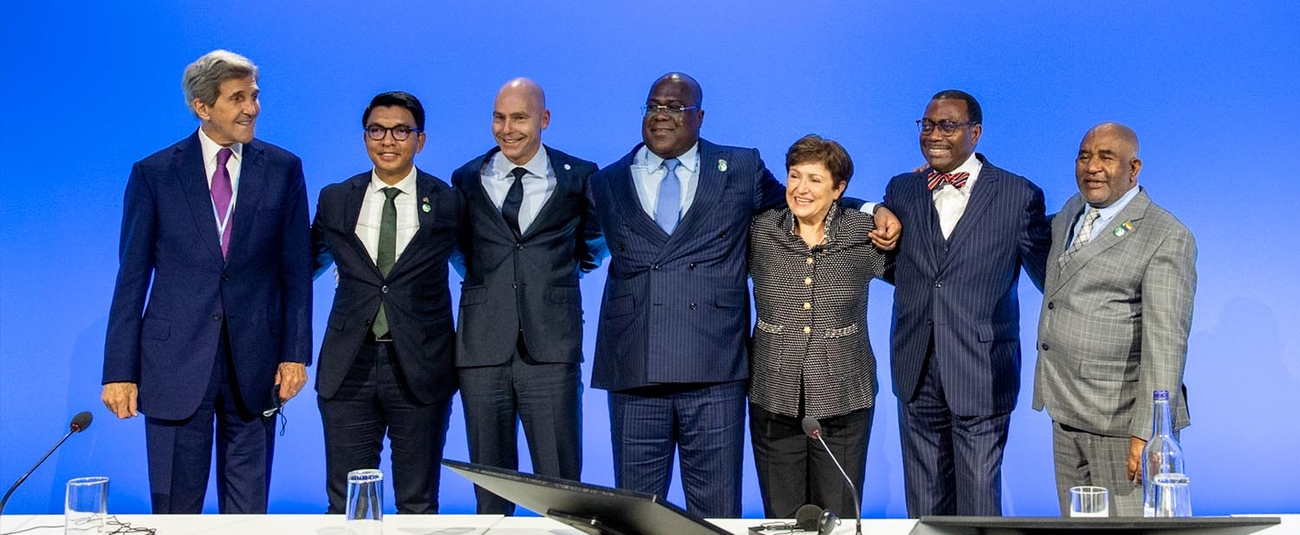
African and other global leaders came together at COP26 in Glasgow yesterday for the Africa Adaptation Acceleration Summit, the largest summit to date on climate adaptation.
The summit called for the rest of the world to ramp up its support for the African continent as it adapts to the adverse effects of climate change, including devastating human impacts in Madagascar, where 1.3 million people live under food distress following four years of no rain. Madagascar’s situation has been described as the first climate induced drought.
President Félix Tshisekedi of the Democratic Republic of Congo and Chairperson of the African Union led Tuesday’s event. He highlighted the $6 billion in financial commitments for climate adaptation that African countries had put forward in their nationally determined contributions (NDCs) and called for increased funding to produce the additional $27 billion a year that the continent requires.
President Tshisekedi said: “Adaptation finance flowing to Africa is grossly insufficient compared to the enormous resources needed for the continent to adapt to climate change. That is why African countries, working with the Global Center on Adaptation, the African Development Bank, and other partners, launched the Africa Adaptation Acceleration Program (AAAP). The program lies at the heart of Africa’s climate change needs. It is Africa-owned and Africa-led. African nations have endorsed it as Africa’s preferred mechanism to deploy adaptation finance for adaptation projects in Africa.”
African Development Bank Group President Dr Akinwumi A. Adesina said: “The Africa Adaptation Acceleration Program is a game changer for Africa to deliver results and impacts on adaptation, fast and at scale. It will support 30 million farmers with digital climate advisory services. The Technologies for African Agricultural Transformation program supported by the African Development Bank and the Bill and Melinda Gates Foundation has already delivered climate resilient technologies for 11.2 million farmers in just two years.”
He added: “With the Africa Adaptation Acceleration Program, we expect to reach 40 million farmers. We plan to support farmers in producing 100 million metric tons of food, which will be enough to feed 200 million people and reduce hunger by 80%.”
Moderating summit proceedings, Patrick Verkooijen, CEO of the Global Center on Adaptation, underscored the urgent need for accelerated climate adaptation action across the continent: “COP26 must deliver on the promises of Paris,” he said. “We are failing and we are failing Africa. We must bring more ambition and more finance to help Africa adapt to the pace of a climate emergency devastating the continent with increasingly serious consequences for the world’s poorest and most vulnerable,” the GCA CEO added.
COP26 President Alok Sharma announced $197 million in new funding for adaptation for Africa from the UK government. Of this amount, $27 million will support the Africa Adaptation Accelerated Program upstream facility to deliver technical assistance and a pipeline of bankable projects. The package is expected to unlock almost $1.2 billion for climate adaptation in Africa. Sharma said there will be more to come.
US Secretary of State Antony Blinken also announced new funding for climate adaptation from the United States government. He said the US President would work with the US Congress to dedicate $3 billion annually in adaptation finance by the year 2024. This is the largest commitment ever made by the US to reduce the impact of climate change in those most endangered by it around the world.
Global and African Leaders Welcome Launch of GCA Africa as “Historic Moment to Accelerate Adaptation” on the Continent
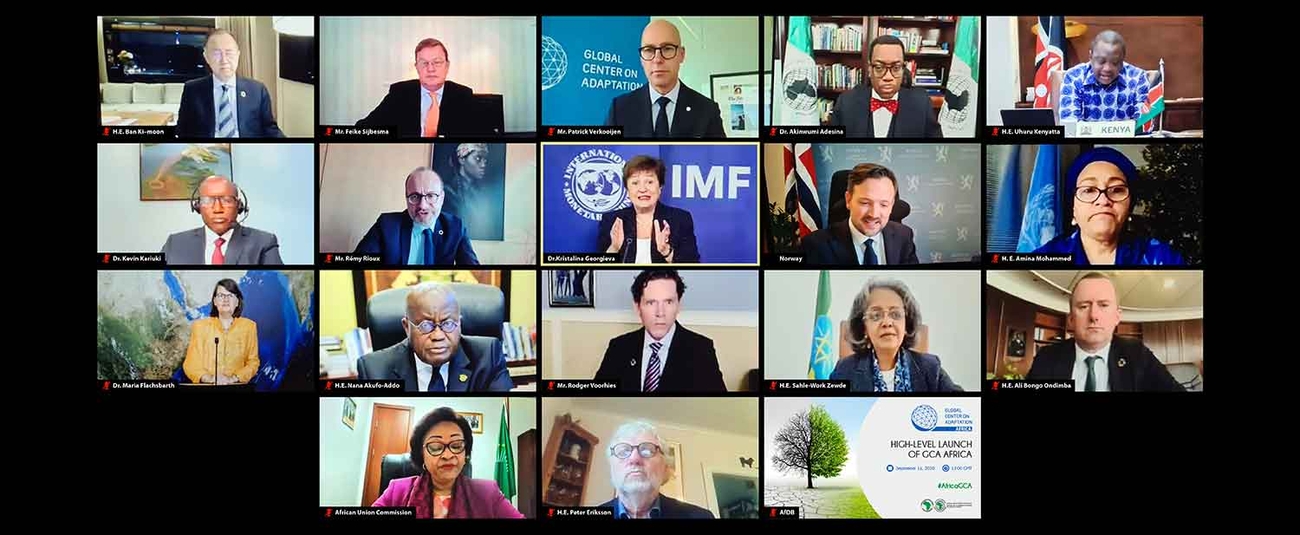
The Global Center on Adaptation today announced the launch of its regional office in Côte d’Ivoire.
Hosted by the African Development Bank at its headquarters in the Ivorian capital Abidjan, GCA Africa will work with partners across the continent to scale and accelerate adaptation action that protects African communities from the impacts of climate change.
GCA Africa will focus on programs and action, knowledge acceleration and capacity building and agenda-setting that respond to the acute challenges from the changing climate facing African countries.
The GCA Africa programs include improving the food security of one billion people in Sub-Saharan Africa by 2030 through a program on rural well-being and food security, as well as projects to support communities through water for urban growth and resilience; using nature for more resilient infrastructure; adaptation finance and building youth leadership.
Commenting on the launch, Ban Ki-moon, Co-Chair of the Board of the Global Center on Adaptation and 8th Secretary-General of the United Nations said:
“This is a historic moment to accelerate adaptation in Africa. Nowhere is the challenge of achieving sustainable development in the face of a changing climate more acute. Our new regional office will support regional and national adaptation efforts by emphasizing and spreading existing best practices on the continent and ensuring their fully fledged integration into broader international adaptation efforts”.
Dr. Akinwumi Adesina, President of the African Development Bank said:
“I am delighted with the launch today of the Global Center on Adaptation for Africa (GCA) hosted by the African Development Bank. The Bank has committed to doubling its financing for climate to $25 billion by 2025, with over 50% devoted to climate adaptation. Africa must not be short-changed by global climate finance. We will partner with the GCA to mobilize more resources for climate adaptation in Africa.”
Ali Bongo Ondimba, President of Gabon and Chair of the African Adaptation Initiative said:
“The devastating effects of climate change, which include severe droughts, floods, reduced agricultural yields, sea-level rise, and other climate-related disasters, are on the rise. The launch of GCA Africa is a bold and innovative initiative to galvanize the support needed to significantly scale up adaptation on the continent, identify gaps and connect regional partners to find solutions.”
Quotes from other partners:
Kristalina Georgieva, Managing Director, International Monetary Fund said:
“More than any other region, sub-Saharan Africa is vulnerable to the impact of climate change, which threatens lives and livelihoods and undermines economic growth. After the current crisis, boosting resilience is an urgent priority so it’s vital we share the knowledge and best practice that can help accelerate climate adaptation.”
Amina J. Mohammed, Deputy Secretary General of the United Nations said:
“There is an urgent need to step up the support for people in Africa, and around the world, affected by climate change. I welcome the Global Center on Adaptation Africa as a crucial partner in delivering the elevated ambition and enhanced action that is needed to make this shift towards a resilient future.”
Feike Sijbesma, Co-Chair of the Board of the Global Center on Adaptation and Honorary Chairman of Royal DSM said:
“Millions of lives depend on Africa’s agricultural sector. Adapting and improving its resilience to climate change is therefore a must. By investing in African local food systems we catalyze sustainable value chains and support the vulnerable but small-scale often female producers.”
Nana Akufo-Addo, President of Ghana said:
“Adaptation to the impact of our changing climate is essential if Ghana is to continue to grow and prosper. We look forward to working with GCA and its partners to meet the challenge of climate change and ensuring resilience is built into Africa’s economic recovery plans.”
Dag-Inge Ulstein, Minister of International Development for Norway said:
“Climate change is not only damaging for the environment, but devastating also for development. It is important that countries around the world, especially our partners in Africa, work together to address these global challenges. Norway is pleased to be able to support GCA Africa in accelerating this agenda.”
Peter Eriksson, Minister for International Development Cooperation for Sweden said:
“GCA is a key solutions broker and center of excellence with a holistic approach that aims to accelerate adaptation solutions for a climate-resilient future in Africa. By working with GCA Africa we will intensify climate adaptation efforts to ensure we integrate solutions to have a coherent response to our climate emergency.”
Patrick Verkooijen, CEO of the Global Center on Adaptation said:
“The impacts of climate change are already being felt across Africa and will only increase in magnitude. Adaptation is not a nice-to-have, it’s a necessity. Through our role as a solutions broker, GCA Africa will work closely with partners in every sector to ensure the most effective adaptation measures are shared and scaled across the continent, responding to the growing demand for strengthening resilience to the impacts of our changing climate.”
The launch of GCA Africa comes shortly after the launch of its South Asian office in Dhaka by Prime Minister Sheikh Hasina in September 2020. Its first regional office was launched in Beijing by Premier Li Keqiang in June 2019.
In May 2020, GCA Africa published a GCA policy brief(link is external), with the African Adaptation Initiative and endorsed by 54 Heads of State and Government, which recommended focusing stimulus investment in Africa on resilient infrastructure and food security to overcome the COVID-climate crisis.
The GCA is the lead partner institution for the Climate Adaptation Summit in the Netherlands – the first major gathering of international leaders dedicated entirely to adaptation. The summit takes place on 25 January 2021 and is hosted by Prime Minister Mark Rutte of the Netherlands. The GCA is also the Managing Partner to the Climate Vulnerable Forum and Vulnerable Twenty (V20) Group of Ministers of Finance, a group of 48 developing countries highly vulnerable to climate change.
Watch the launch at the following links:
About the Global Center on Adaptation
The Global Center on Adaptation (GCA) is an international organization which works as a solutions broker to accelerate action and support for adaptation solutions, from the international to the local, in partnership with the public and private sector, to ensure we learn from each other and work together for a climate resilient future. Founded in 2018, the GCA is hosted by the Netherlands. Through an evolving network of offices and global and regional GCA teams including a global innovation hub for climate adaptation launched by Premier Li Keqiang in Beijing, the organization engages in high-level policy activities, new research contributions, communications, and technical assistance to governments and the private sector.

